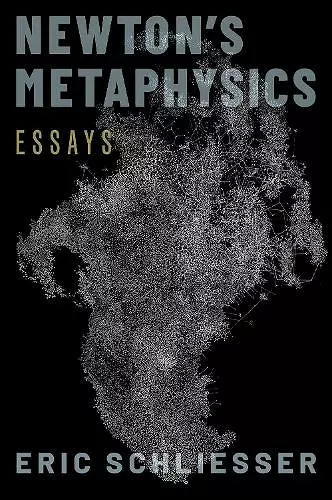Newton's Metaphysics
Essays
Format:Hardback
Publisher:Oxford University Press Inc
Published:12th Oct '21
Currently unavailable, and unfortunately no date known when it will be back

In this collection of new and previously published essays, noted philosopher Eric Schliesser offers new interpretations of the signifance of Isaac Newton's metaphysics on his physics and the subsequent development of philosophy more broadly. Schliesser address Newton's account of space, time, gravity, motion, inertia, and laws-all evergreens in the literature; he also breaks new ground in focusing on Newton's philosophy of time, Newton's views on emanation, and Newton's modal metaphysics. In particular, Schliesser explores the rich resonances between Newton's and Spinoza's metaphysics. Schliesser presents a new argument of the ways in which Newton and his circle respond to the treatment and accusations of Spinozism, illuminating both the details of Newton's metaphysics and the content of Spinoza's. Schliesser provides a fine-grained analysis of some of the key metaphysical concepts in Newton's physics, including controversial interpretations of Newton's ideas on space, time, inertia, and necessity. Schliesser restates his provocative interpretation of Newton's views on action at a distance as he was developing the Principia. Newton's Metaphysics contains a substantive introduction, two chapters co-authored with Zvi Biener and with Mary Domski, new chapters on Newton's modal metaphysics and his theology, and two postscripts in which Schliesser responds to some of his most important critics, including Katherine Brading, Andrew Janiak, Hylarie Kochiras, Steffen Ducheyne, and Adwait Parker. The collection presents new and varied analyses on familiar focuses of Newton's work, adding important perspectives to the recent revival of interest in Spinoza's metaphysics.
In this wonderful collection of essays, Eric Schliesser embarks on an ambitious and long-awaited intellectual project: charting the complex and subtle nuances of the metaphysical view underpinning Newton's physics. In his characteristically visionary style, Schliesser invites us to explore the modal metaphysics at work behind Newton's notion of gravity, motion and laws of nature. The result is a fascinating and unrivalled journey through a less well-known Newton, one who did not shy away from engaging with metaphysical debates about necessity, chance and fatalism, and whose far-reaching contributions extend well beyond the realm of natural philosophy. This book is a gem for anyone interested in historical debates at the conjunction between physics and metaphysics. * Michela Massimi, University of Edinburgh *
This book provides rich new insights into Newton's metaphysics and philosophical theology. By placing Newton's thought in the context of early modern philosophy-and, in particular, the controversy over Spinozistic 'atheism'-Schliesser succeeds in illuminating a variety of puzzling issues not only about Newton but about a number of Newton's contemporaries, including Toland, Clarke, and Bentley. This book is highly recommended not only to Newton scholars, but to anyone with an interest in early modern philosophy. * Kenneth L. Pearce, Trinity College Dublin *
Schliesser's essays are at the cutting edge of current research on Newton's philosophy. Important interpretive issues in Newton's treatment of space, causation, gravity, scientific method, and the role of God in the natural world are here addressed by one of the world's leading experts. The contributions to our understanding of Newton's treatment of time and of the relationship of his system of thought to Spinoza's are especially noteworthy. The breadth of the topics will encourage many readers interested in philosophy and science who have not yet studied Newton to discover reasons that they should. * Alan Nelson, University of North Carolina at Chapel Hill *
The book stands out on another count that matters. A magnanimous spirit pervades it -of intellectual generosity toward Schliesser's peers, especially the young ones, whose voices sometimes go unheard- coupled with a good deal of humility. In that respect, Schliesser teaches a lesson we could all stand to learn. * Marius Stan, Journal of The History of Philosophy 62:1 *
ISBN: 9780197567692
Dimensions: 166mm x 240mm x 28mm
Weight: 621g
328 pages